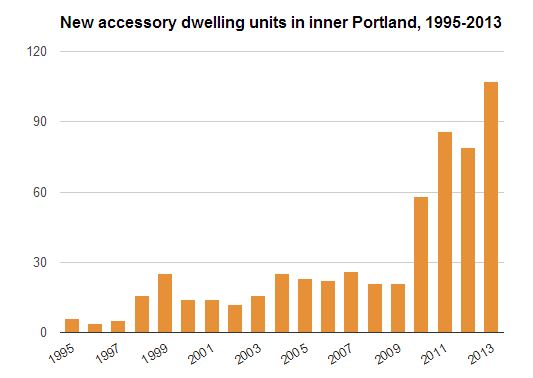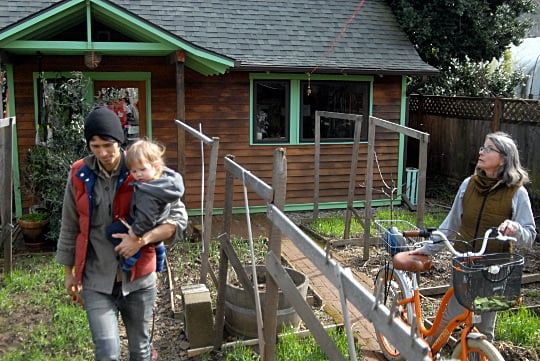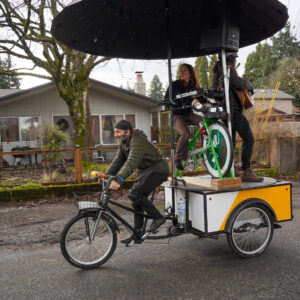
(Photo courtesy Peterson.)
 Portland’s enthusiasm for building small and tiny homes has been so abrupt, so unusual and so locally unique that the home mortgage industry hasn’t figured out how to take advantage of it.
Portland’s enthusiasm for building small and tiny homes has been so abrupt, so unusual and so locally unique that the home mortgage industry hasn’t figured out how to take advantage of it.
But people in both government and real estate who see accessory dwelling units as a boon for affordable density in bike-friendly, walkable parts of town are trying to help lenders catch up. And there are signs that it’s working.
As we reported last month, Portlanders are responding to the surging demand for local housing by building and/or permitting hundreds of accessory dwelling units. One in 10 new homes in some inner north and Northeast neighborhoods is an ADU, a city specialist says.
This is the latest part of a story we’ve been covering here on BikePortland for years: the ways Portland can keep creating the proximity that makes biking pleasant not just to high-rise dwellers but to those who prefer freestanding homes.
Portlanders, city data show, have taken the problem into their own hands. And yards.

(Source: Portland Bureau of Planning and Sustainability.)
Taylor Watkins, a Portland-based appraiser who specializes in ADUs, said local Realtors are now “putting into their listings ‘possible ADU,’ like, ‘there’s room in the basement or on the lot where you can put an ADU.’ That’s just been in the last 18-24 months that I’ve seen that.”
But amid the excitement, there’s a financial catch: Building a second home on a mortgaged lot requires either a lot of cash, a lot of unused equity, a second mortgage … or a refinancing loan for more than a property is currently worth.
“That loan product is exactly the same loan product that was quite abused in the lead-up to the housing crunch,” said Eli Spevak, a Portland co-housing developer.
Spevak, who the Portland Mercury called “the coolest condo developer ever” in 2008, spoke by phone from Cambridge, where a Loeb Fellowship at Harvard University has given him a year to study the business and policy behind small, dense single-family homes. He said the rapid growth in demand for close-quarters housing is being slowed by a home-finance industry that’s understandably shy about creating new products.
“The mortgage industry in the past four years has been the opposite of an innovative industry,” Spevak said. “It’s been contracting the options.”
Explaining ADU law to homeowners appraisers, insurers, brokers and other industry pros is another obstacle, said Jordan Palmeri, a science and policy analyst in the state Department of Environmental Quality’s green building program.
“Joe Homeowner becomes a developer overnight when he decides to put an ADU in the backyard,” Palmeri said. “You’re basically training homeowners to become developers.”
Palmeri is hoping to educate the community with a free financing guide that the state will publish in June, listing local banks that offer financing options for ADUs. He’s hoping that’ll push more of them to create ADU-focused programs. It’ll be released to coincide with a one-day tour that’ll invite people inside local ADUs.

(Photo by M.Andersen/BikePortland)
In the meantime, Spevak suggested a few plausible options for raising enough cash to add an ADU:
Home equity credit: Good if you’ve paid down a lot of your mortgage. “Empty-nesters, that kind of generation, are doing it with traditional mortgage financing, equity lines of credit,” Spevak said.
Cobble cash together: This works for low-cost ADUs like converted basements. (To qualify for an ADU permit in Portland, a unit needs a bedroom, bathroom, full kitchen and its own entrance.) “If you’re converting something to an accessory dwelling unit, sometimes the conversion can be pretty inexpensive,” said Spevak. “In that case people, I’m guessing, are just doing it on credit card debt.”
Refinance: A refinanced first mortgage that includes the construction cost of the new unit is “the ideal” for buying an ADU if you don’t have capital on hand, Spevak says. Advantis Credit Union is locally known for a program like this, but it doesn’t currently offer a 30-year fixed rate — only a 15-year fixed and a 5/1 adjustable rate mortgage. Another downside: many homeowners have already refinanced into low interest rates.
Get a second mortgage: “They tend to have pretty high rates,” Spevak says. “The problem is that that first loan is going to have a provision in it that says it gets anything on the property. … You can’t just carve out something for the second lender to have something yummy that the first lender doesn’t have.”
Create a condo association: Spevak did this for his Sabin Green project. He estimates that separating the ownership of the units from the ownership of the lot cost about $20,000 in all. “It actually wasn’t hard for me to do at all,” he said. “It really worked out.”
Spevak said he thinks Portland lenders may be the first in the country to make these options easier and cheaper for consumers.
“I think there’s a chance for local credit unions to innovate with new products, and I think Portland’s a good market for that to happen,” he said. “Home values are going up again. People are going to want to tap the equity in them. … If you’re a lender and you want to stay in business, you’re going to have to come up with ways to get loans to people who don’t want to refinance.”
— The Real Estate Beat is a weekly column sponsored by real estate broker Lyudmila Leissler of Portlandia Home/Windermere Real Estate. Let Mila help you find the best bike-friendly home.
You can sign up to get an email of Real Estate Beat posts (and nothing else) here.






Thanks for reading.
BikePortland has served this community with independent community journalism since 2005. We rely on subscriptions from readers like you to survive. Your financial support is vital in keeping this valuable resource alive and well.
Please subscribe today to strengthen and expand our work.
Great info.
It is bizarre what banks will and will not loan on. I tried to buy a house 2 years ago that had a second house on the property. Both homes were built legally and fully permitted and the appraisal was for more than my offer. The sale fell through because the appraiser felt that the property would be worth even MORE if it were split into two separate lots and therefore no bank would give me a loan. Made no sense to me but apparently it crossed up some underwriting rule they all seem to have.
I don’t want an Accessory Dwelling Unit. I want a small house. Not necessarily “tiny” but the McMansions they’re putting up everywhere make me nauseous.
Doug, split your lot and or build an ADU and call it what you like.
There are a decreasing number of open lots in the city that are available for development and building small is less of an economic option. That’s why many empty lots have been bought by the Renaissance type builders and cookie cutter, 4-square knock offs are utilizing all the buildable footprint of a virgin lot. This is at the expense of the neighborhood, for the benefit of the absentee developer. ADUs and small homes on small lots allow for a community density shown in the article, unlike the cookie cutter spec homes, which create suburban experiences of isolation and ordinary existence.
My recommendation to you is split your lot and build two small homes or condo assoc. as mentioned or build a home and an ADU and let the ADU cash flow finance your small home dreams.
Thanks for this week’s article. A follow-up on the growth of ADU permits in relation to the moratorium on City STC charges would be appreciated.
LOL I don’t have a lot to split, and I don’t want to buy one big house in order to build another smaller one. I just want a smaller house. Do you know where to find one? This article is a little old, but it appears to take some gild of the lily – http://tinyhousetalk.com/cautionary-tale-on-tiny-houses/
Doug,
Assuming you are in Portland, it’s actually not too hard to find 700sqft or less detached houses, down to around the 500sqft range. I’ve looked at several myself. They do tend to be in the less dense parts of the city, ie. North Portland N of Killingsworth, NE Portland east of 42nd and in the southern parts of the SE. They are, oftentimes priced higher than it seems they should be, as there is an assumption they will be torn down and the land will be used to cram in the tall skinny large houses that are spreading like some kind of invasive weed over parts of Portland like Kenton. However with current rent prices skyrocketing it would not be at all uneconomical to buy one and live in it. And your neighbors would likely love you for saving it.
A 715 ft^2 house just sold two blocks from us in Mt Scott/Arleta. Detached garage and nicely done yard, but we were amazed that they actually got full asking price ($215K!!!!!). There are plenty of smaller houses in outer NE and SE (which can be pretty dense (just not like downtown)). Some can be overpriced, but I think you can still get some deals.
TONS of tiny detached houses in Kenton.
Doug, my misunderstanding. I thought you first comment was in relation to the content of the article and it sounds like they are not related. If you subscribe to a real estate listings I see a small home listed about every day. I believe the article sponsor, Mila with Portlandia Home could set you up with an email subscription for home listings matching your preferences.
Similar to what Jedito and Davemess commented on, there are plenty, but from what I’ve seen, you will probably pay more per $ than a larger comparable home.
I’ve never seen one of these for sale or rent… I’d love to live in one…
-More $/sf.
Aloha everyone. It’s amazing to me that Portland doesn’t have zoning restrictions for ADU’s. Here in Honolulu they use to allow “ohana” dwellings, which is another smaller residence on a R-5 lot (5000 sq ft). That law was changed years ago. Now you can only have one legal structure with one kitchen. People can CPR (condominium property regeme) their lots if they meet certain requirements, and that would be one way to legally detach a portion of a lot to another owner so you could build a ADU and have complete deeded ownership of that ADU residence and lot. A separate taxable lot to build on can be a blessing and a curse. Imagine splitting your city lot selling off the land only to have someone you don’t care for living in essentially your back yard with that person having complete ownership rights. CPR’s can devalue a property as well when compared to non CPR’d lots. Don’t get me wrong, I am all for tiny houses that create more sustainable and affordable living! PDX should look to Hawaii to see what has happened here and see if our outcome is something Portlanders would want.